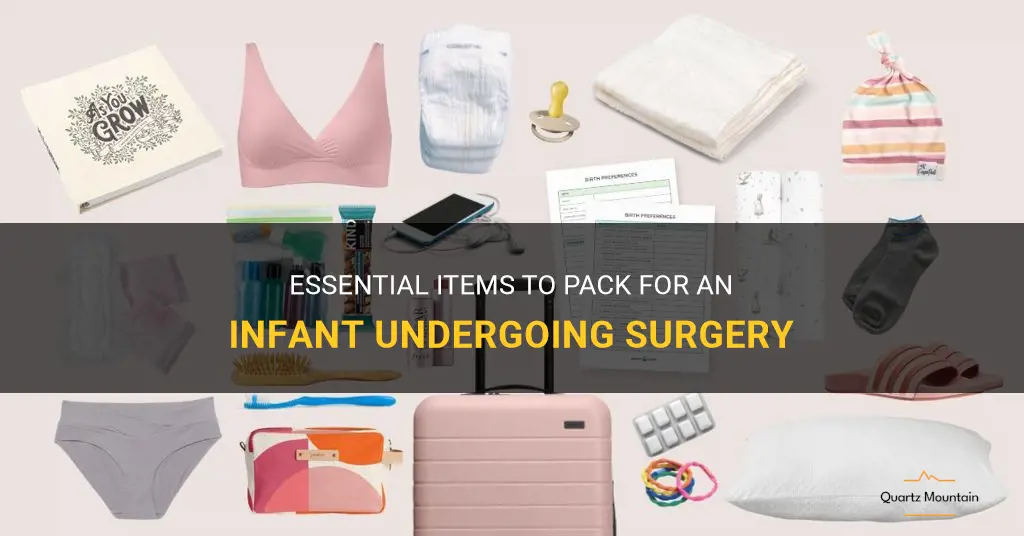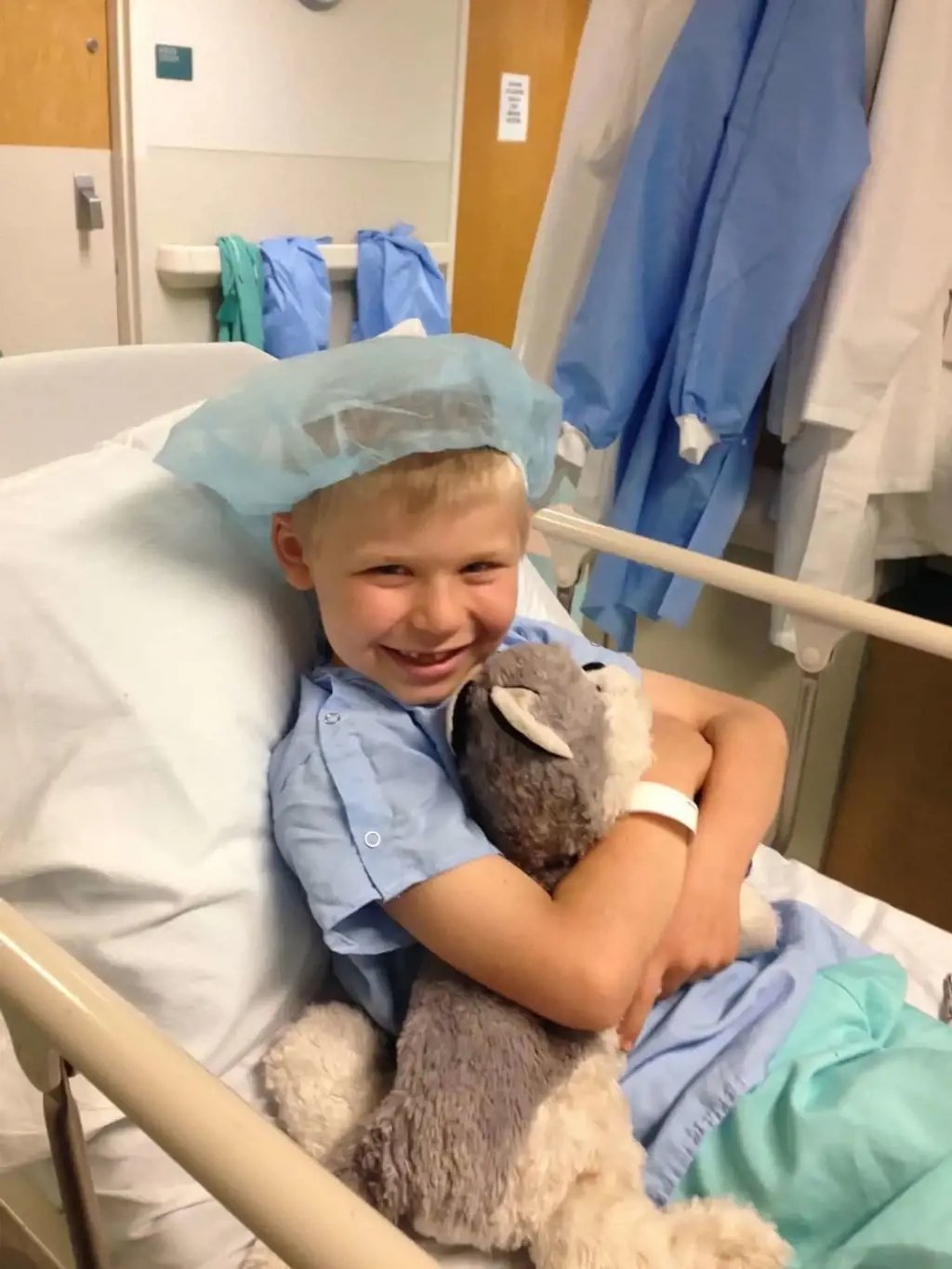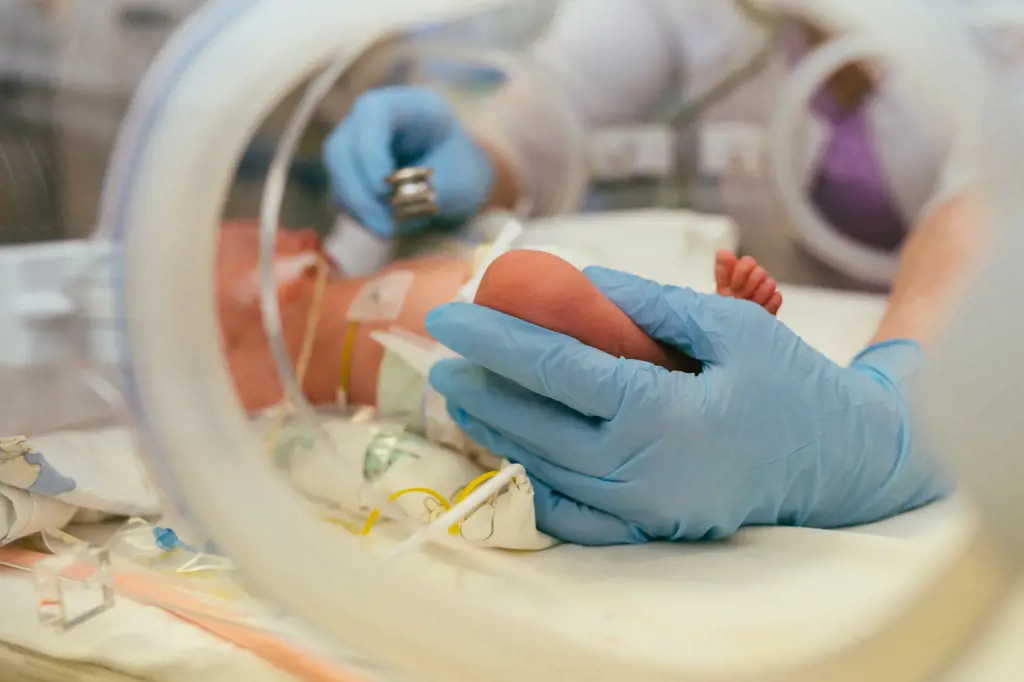
When a little one is preparing to undergo surgery, there are many things that parents must consider to ensure their infant's comfort and well-being throughout the process. From pre-operative preparations to post-operative care, one crucial aspect is packing essential items that will make the journey smoother for both the baby and their parents. In this article, we will explore the various items that should be included in a parent's list when packing for an infant undergoing surgery, ensuring that all bases are covered and the baby's needs are met.
What You'll Learn
- What are the essential items to pack for an infant who is undergoing surgery?
- Are there any specific clothing or bedding essentials that should be included in the packing list for an infant having surgery?
- Are there any special toys or comfort items that can help soothe an infant during the recovery process?
- Should parents pack any specific medications or medical supplies for their infant's post-operative care?
- Are there any additional items that should be included in the packing list for an infant's surgery, such as snacks or entertainment options for the parents?

What are the essential items to pack for an infant who is undergoing surgery?

Having an infant undergo surgery can be an overwhelming experience for both the parents and the child. However, being well-prepared and having all the necessary items with you can help alleviate some of the stress. Here is a list of essential items to pack for an infant who is undergoing surgery:
Comfort items:
- Blanket or swaddle: Pack a soft and cozy blanket or swaddle to provide comfort for your infant during their hospital stay.
- Favorite toy or pacifier: Bringing along your child's favorite toy or pacifier can help soothe and distract them from any discomfort.
Clothing:
- Extra clothes: It's important to pack extra sets of comfortable and easy-to-change clothing for your infant, as accidents and spills can happen.
- Onesies with snaps: Opt for onesies with snaps rather than buttons, as they are easier to manage during the recovery process.
Diapers and wipes:
- Disposable diapers: Pack a sufficient supply of diapers to last throughout your infant's hospital stay.
- Baby wipes: Don't forget to pack baby wipes for easy and convenient diaper changes.
Feeding essentials:
- Bottles and formula: If your infant is bottle-fed, make sure to pack enough bottles and formula for their feeding needs.
- Breast pump and storage bags: If you are breastfeeding, bring a breast pump and storage bags to collect and store breast milk.
- Burp cloths: Keep burp cloths handy for feeding and soothing your infant after surgery.
Medications and medical supplies:
- Prescription medications: If your infant has any prescribed medications, be sure to pack them along with the dosage instructions.
- Thermometer: Bring a digital thermometer to monitor your infant's temperature during their recovery.
- Band-aids and gauze: Pack a small first aid kit with band-aids and gauze for any minor cuts or wounds that may occur.
Entertainment:
Books or tablets: Having some form of entertainment can help distract your infant during their recovery. Pack some age-appropriate books or a tablet with engaging content.
Important documents:
- Medical records: Carry your infant's medical records, including any recent tests or scans, in case they are needed during their hospital stay.
- Insurance information: Keep a copy of your infant's insurance card and any necessary paperwork in case of emergencies.
It's important to check with the hospital and your child's healthcare provider to ensure you have all the necessary items specific to your infant's surgery and recovery process. Additionally, consider packing some extra snacks and personal items for yourself to help make the experience more comfortable and manageable for you as well. Remember to stay calm and positive during this time, as your emotional state can greatly impact your infant's wellbeing.
The Essential Bag to Pack for an Unforgettable Summer Camp Experience
You may want to see also

Are there any specific clothing or bedding essentials that should be included in the packing list for an infant having surgery?

When an infant is scheduled to have surgery, it is important to carefully plan and pack all the necessary clothing and bedding essentials. These items can help ensure the comfort and safety of the baby before, during, and after the procedure. In this article, we will discuss the specific clothing and bedding essentials that should be included in the packing list for an infant having surgery.
Soft and comfortable clothing:
It is important to pack soft and comfortable clothing for the baby, as they will be spending a significant amount of time in the hospital. Opt for clothing made from natural, breathable fabrics such as cotton. Avoid clothing with tight elastics or buttons, as they can cause discomfort and irritation to the baby's healing incision. Pack several onesies and sleepers, as they are easy to put on and take off.
Loose-fitting clothing:
After the surgery, the baby may have dressings or bandages that need to be protected. Pack loose-fitting clothing that will not put pressure on the surgical area. One-piece outfits such as footie pajamas or gowns can be a good option, as they are easy to put on and remove without disturbing any dressings or bandages.
Front-opening clothing:
Due to the sensitivity and tenderness of the surgical area, it is best to avoid clothing that needs to be pulled over the baby's head. Instead, opt for front-opening clothing such as onesies or shirts with snaps or buttons. This will make it easier to dress the baby without causing discomfort or pain.
Blankets and bedding:
Pack a few soft and lightweight blankets to keep your baby warm and comfortable during their hospital stay. Choose blankets made from breathable materials such as cotton to prevent overheating. It is also a good idea to bring along a couple of familiar blankets from home, as they can help provide a sense of comfort and security to the baby.
Swaddles and sleep sacks:
Swaddles and sleep sacks can help calm and soothe the baby, especially after the surgery. They provide a comforting and secure feeling, similar to being in the womb. Look for swaddles and sleep sacks that are made from breathable, stretchy, and soft materials. These can help regulate the baby's body temperature and provide a gentle, snug fit.
Changing essentials:
Don't forget to pack a supply of diapers, wipes, and diaper rash cream. The baby may have an increased need for diaper changes due to medications or changes in their diet after the surgery. It is also a good idea to pack a few extra sets of clothes in case of accidents or leaks.
Extra laundry bags:
Having a separate laundry bag to store soiled clothing can help keep the baby's other belongings clean and hygienic. Pack a few extra large ziplock bags or cloth laundry bags to store the dirty clothes until they can be washed.
In conclusion, packing the right clothing and bedding essentials for an infant having surgery is crucial for their comfort and well-being. By including soft and comfortable clothing, loose-fitting outfits, front-opening options, blankets, swaddles, and sleep sacks, you can ensure that your baby is comfortable during their hospital stay. Additionally, don't forget to pack changing essentials and extra laundry bags to manage cleanliness effectively.
Essential Items to Pack for a Memorable Trip to Coral Bay
You may want to see also

Are there any special toys or comfort items that can help soothe an infant during the recovery process?

Infants can go through a variety of medical procedures and illnesses that require a recovery period. During this time, it is important to provide them with comfort and support to help soothe their discomfort. One way to do this is by using special toys or comfort items that can help distract and calm the infant.
One popular comfort item for infants is a stuffed animal or plush toy. These soft and cuddly toys can provide a sense of security and familiarity to the infant, which can be especially important during times of stress or discomfort. The infant can hold onto the toy, snuggle with it, or use it as a comfort object, providing them with a soothing and calming effect. Additionally, some stuffed animals come with special features such as a vibrating function or a music player, which can further help to soothe the infant.
Another comfort item that can help soothe an infant during the recovery process is a pacifier. Pacifiers are designed to mimic the sucking action that babies naturally do, which can help to comfort and relax them. The sucking motion can release endorphins in the infant's brain, which can help to reduce pain and provide a sense of calm. Additionally, the use of a pacifier can help to distract the infant from any discomfort they may be experiencing.
Some infants may also find comfort in certain sensory toys or items. For example, a sensory blanket or lovey can provide the infant with a variety of textures and sensations to explore. This can be particularly helpful for infants who are experiencing discomfort or pain, as it can help to redirect their focus and provide them with a sense of comfort and stimulation.
It is important to note that not all infants will find comfort in the same toys or comfort items. Each baby is unique and may respond differently to different stimuli. It may take some trial and error to find the right toy or comfort item that works best for your infant. Additionally, it is important to ensure that any toys or comfort items used are safe and appropriate for the infant's age and developmental stage.
In conclusion, there are several special toys and comfort items that can help soothe an infant during the recovery process. Stuffed animals, pacifiers, and sensory toys can all provide a sense of comfort and distraction for the infant, helping to alleviate any discomfort or pain they may be experiencing. It is important to find the right toy or comfort item that works best for your infant, and to ensure that it is safe and appropriate for their age and developmental stage.
Essential Items to Pack for an Overnight Field Trip
You may want to see also

Should parents pack any specific medications or medical supplies for their infant's post-operative care?

After a surgical procedure, parents need to be prepared to provide proper care and support for their infants during the post-operative period. This includes having the necessary medications and medical supplies on hand. While every case is different, there are certain medications and supplies that parents should consider packing in their post-operative care kit.
- Pain medications: Depending on the type of surgery, infants may experience pain or discomfort. Your pediatrician or surgeon will likely prescribe pain medications for your child. It is important to have these medications on hand and to follow the recommended dosage instructions. These medications may include liquid acetaminophen or ibuprofen, and it is essential to use appropriate measuring tools to ensure correct dosages.
- Antibiotics: In some cases, infants may be prescribed antibiotics to prevent or treat potential infections after surgery. It is crucial to follow the prescribed antibiotic regimen and finish the entire course of treatment. Be sure to ask your doctor about any potential side effects or special instructions associated with the antibiotics.
- Wound care supplies: Depending on the type of surgery, your infant may have a surgical incision or wound that requires regular care. Some common wound care supplies include sterile gauze pads, adhesive bandages, antibiotic ointment, and surgical tape. It is important to keep the wound clean and dry, and to follow any specific instructions provided by your doctor or surgeon regarding wound care.
- Dressings and compression garments: Certain surgeries may require the use of dressings or compression garments to promote healing or reduce swelling. These may include special bandages or wraps that need to be applied and changed regularly. It is essential to follow the specific instructions provided by your doctor to ensure proper wound healing.
- Stool softeners: Some surgeries or medications can cause constipation in infants. To help prevent discomfort or straining during bowel movements, your doctor may recommend stool softeners. These medications can help soften the stool and make it easier for your infant to pass.
- Feeding supplies: Depending on the surgery and recovery guidelines, your doctor may recommend a specific feeding plan for your infant. This may include a modified diet, specific feeding techniques, or the use of specialized formulas or breast milk. It is important to follow these recommendations closely and have the necessary feeding supplies on hand.
- Thermometer: A reliable thermometer is an essential tool for monitoring your child's temperature during the recovery period. Fever can be a sign of an infection or other complications, so it is important to be able to measure your infant's temperature accurately.
It is crucial to consult with your child's healthcare provider or surgeon ahead of time to determine the specific medications and supplies you will need for your infant's post-operative care. They will be able to provide you with personalized instructions and recommendations based on your child's specific medical history and the type of surgery they have undergone. Following their guidance and having the necessary medications and supplies readily available will help ensure that your infant's recovery is as smooth and comfortable as possible.
Essential Items to Pack for a Memorable Dirty Weekend Getaway
You may want to see also

Are there any additional items that should be included in the packing list for an infant's surgery, such as snacks or entertainment options for the parents?

As parents prepare for their infant's surgery, it is essential to have a comprehensive packing list to ensure a smooth and comfortable experience for both the child and the parents. While the primary focus is often on the baby's needs, it is also necessary to consider additional items that can support the parents during this stressful time. This may include snacks and entertainment options to keep the parents occupied during the waiting periods and help them maintain their energy and emotional well-being.
Snacks:
During a surgery day, parents may experience long waiting times at the hospital or clinic. It is crucial to pack some healthy snacks to keep their energy levels up and prevent hunger pangs. Preparing easy-to-eat snacks like granola bars, nuts, fruits, or sandwiches would be ideal. Moreover, packing some bottles of water and juice boxes can help keep the parents hydrated throughout the day.
Entertainment Options:
Hospitals and clinics can often be busy and hectic, leaving parents with idle time in waiting rooms. Bringing along some form of entertainment can help pass the time and distract from anxiety. It is advisable to consider activities that are easy to carry and engage in, such as books, magazines, puzzles, or handheld electronic devices like tablets or smartphones. These can provide a welcome distraction and offer a sense of comfort during the waiting periods.
Comfort Items:
In addition to snacks and entertainment options, including personal comfort items for the parents can be beneficial. This can include items like a travel pillow, a small blanket, or a cozy sweater to help them relax and feel at ease during potentially long wait times. Creating a cozy and familiar environment can provide a sense of comfort and security amidst a stressful situation.
Support Necessities:
Parents may find themselves needing specific support items during the surgical process. It is essential to pack any necessary medications, eyeglasses, contact lenses, or hearing aids. Additionally, having a fully charged cell phone and a list of important contact numbers can provide peace of mind and ensure effective communication with healthcare providers and loved ones.
Documentation:
Lastly, parents should ensure they have all necessary documentation related to their infant's surgery. This includes identification documents, insurance cards, and any relevant medical records or test results. Organizing and packing these documents in a secure and easily accessible folder can help streamline the registration and admission process.
Remember, every surgery and situation is unique, so it is essential to discuss specific needs and recommendations with the healthcare team beforehand. They can provide valuable insights and assist in tailoring the packing list to meet the individual needs of both the infant and the parents.
In conclusion, while preparing for an infant's surgery, parents should consider additional items to support their own well-being. Packing snacks, entertainment options, comfort items, support necessities, and documentation can help parents feel more comfortable and prepared during long waiting periods. By ensuring both the baby's and the parents' needs are met, the surgical journey can be made a little less stressful for all involved.
The Ultimate Guide to Packing Food for Camping without a Cooler
You may want to see also
Frequently asked questions
When packing for your infant's surgery, it is important to think about their comfort and any specific items they may need. Make sure to pack extra clothes, blankets, and diapers to handle any accidents or spills that may occur during the hospital stay. Additionally, bring any comfort items that your baby may be attached to, such as a favorite toy or blanket, to help them feel more secure during this unfamiliar experience.
It is always a good idea to consult with your child's surgeon or healthcare provider prior to the surgery to see if there are any specific medications they recommend bringing. In general, you should pack any medication that your infant regularly takes, along with a complete list of all medications and dosages. This will help ensure that your child receives their prescribed medications while in the hospital.
In addition to clothing, diapers, and comfort items, there are a few other essential items you should remember to pack for your infant's surgery. First, pack any necessary paperwork, including insurance information and identification. It is also important to bring any necessary feeding supplies, such as bottles, formula, or breastfeeding equipment, to ensure your baby's nutritional needs are met. Lastly, don't forget to pack any necessary personal care items, such as a baby wash and towel, as well as a few extra pacifiers if your baby uses them.







